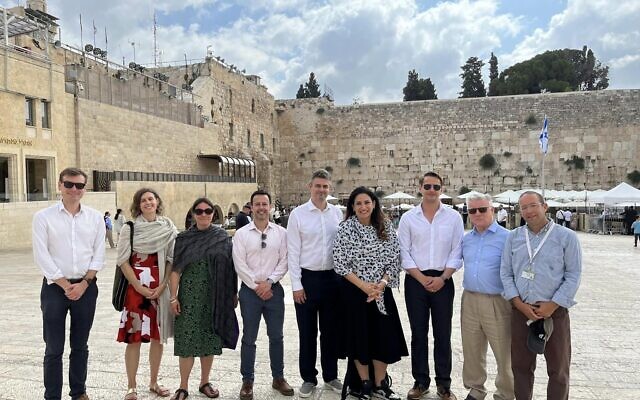Labour’s Parliamentary Candidate for Dover, Mike Tapp, has written the below article about our recent LFI delegation to Israel and Palestine for the Jewish News. Click here to read the original.

Labour Friends of Israel delegation; July 2023
I recently had the privilege of joining a Labour Friends of Israel delegation on a visit to Israel and Palestine.
Among the parliamentary candidates and local councillors on the delegation, it was fantastic to be joined by former MP Luciana Berger. It was Luciana’s first trip to Israel since rejoining Labour, having left the party due to antisemitism under the previous leadership.
Her return shows the real progress Labour has made in the battle against antisemitism under Keir Starmer’s firm and effective leadership.
But the fight against Jew-hate in all its vile and ugly forms is ongoing: I was struck during the trip by the disturbing and ignorant responses from predominantly anonymous trolls on social media regarding our delegation and, indeed, our visit to the Yad Vashem Holocaust memorial. I sincerely hope that such individuals are not affiliated with the Labour Party.
Walking through the narrow alleys of Old City of Jerusalem, we witnessed the close proximity of Christian, Jewish and Muslim holy sites – including the Church of the Holy Sepulchre, Western Wall and Al-Aqsa Mosque – highlighting the intricate tapestry of beliefs, indelible impact of history and the complexities of the conflict in this deeply contested city.
At a refugee camp near Ramallah, we met with a group of men in a smoky cafe who interrupted a raucous game of cards to offer their perspectives. Their daily struggle, living conditions and fear emphasised the urgency of finding a resolution that provides dignity to Palestinians and Israelis alike. Tragically, their deep-seated anger, profound lack of trust in the peace process and Israel, and disturbing comments provided a sobering reminder as to why there appears little hope of progress any time soon.
This lack of optimism and hope for the future was evident when we also met with a Palestinian NGO working with young people. The stalled peace process, the Palestinian Authority’s neglect and lack of vision, and the absence of positive role models for the growing younger generation is creating a truly combustible and a dangerous mix.
Unfortunately, the current security situation meant we were unable to visit Gaza. However, we did spend time at a kibbutz near the Gaza border. Like the Palestinians we met in Ramallah, its residents expressed deep-seated fear and vulnerability due to their proximity to the conflict zones.
As well as telling us about their constant fear of rocket attacks, they also spoke about their struggle to maintain a semblance of normalcy.
Having served in Iraq during a period of high-tempo rocket attacks, I can empathise with the stress and trauma they experienced. However, the resilience of the kibbutz families, particularly the children, in coping with this psychological strain is truly remarkable.
Between visits we held meetings and conversations with Israeli politicians providing a glimpse into the intricate political landscape of the region’s only democracy. Our meeting with President Isaac Herzog primarily focused on the current upheaval in Israeli politics, as the Netanyahu government continues to push through judicial reforms that threaten to severely curtail the important checks and balances provided by the courts.
This dangerous attempt to consolidate power by the Israeli hard right not only risks weakening the Jewish state’s democratic values, it’s also a massive distraction from the challenges and opportunities the country faces. It has, for instance, already slowed the momentum provided by the Abraham Accords, which Israel’s more moderate, “change government” had been pursuing before Netanyahu’s return to power in January.
It was also apparent during our conversations that the search for peace with the Palestinians remains as elusive as ever. It’s true that some on the Israeli right are ideologically opposed to a two-state solution.
However, perhaps the greatest challenge is the absence of belief – among both the Israeli and Palestinian people – that a better, more peaceful future is possible.
As our visit to the Peres Centre, a museum of innovation and peace that honours the life and efforts of the late Shimon Peres, demonstrated, this lack of hope stands in stark contrast to the optimism which greeted the Oslo Accords, which were signed 30 years ago this summer.
Our visit to Israel provided me with a deeper understanding of the complexities of the region and the obstacles hindering the pursuit of peace. It is, of course, crucial for the international community to actively engage, promote dialogue, and encourage leaders to prioritise peace and coexistence over unimaginative, narrow and divisive agendas.
But a Labour government under Keir Starmer can also play a part too. A balanced approach towards the conflict can help Britain foster an open and honest dialogue between Israel and Palestine, working towards a comprehensive and sustainable solution.
We also need a much greater emphasis on civic society action. That’s why I welcome Labour’s commitment to back and drive forward an International Fund for Israeli Palestinian Peace – one modelled on the highly successful International Fund for Ireland – to invest in grassroots peace-building initiatives.
Ultimately, both Israel and the Palestine need new leadership. The Palestinians need real democracy and a younger generation of politicians untarnished by the failings of the PA.
Israel needs a revival of the centre-left, including our friends in the Israeli Labor party, and an end to the cynical politics of the Netanyahu era.


